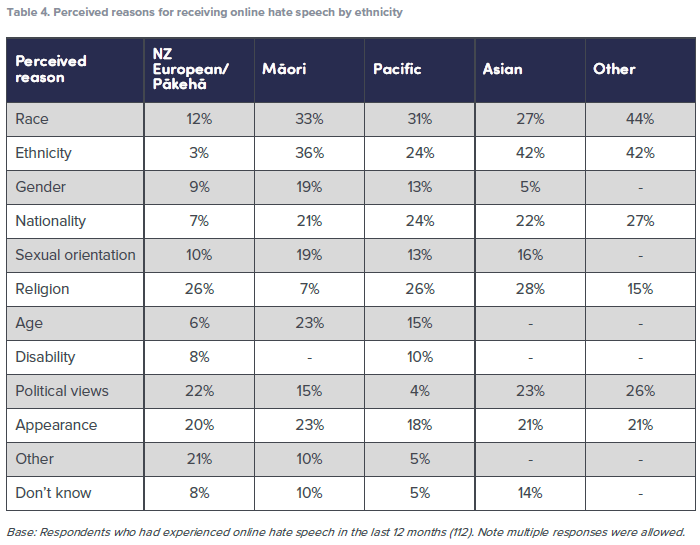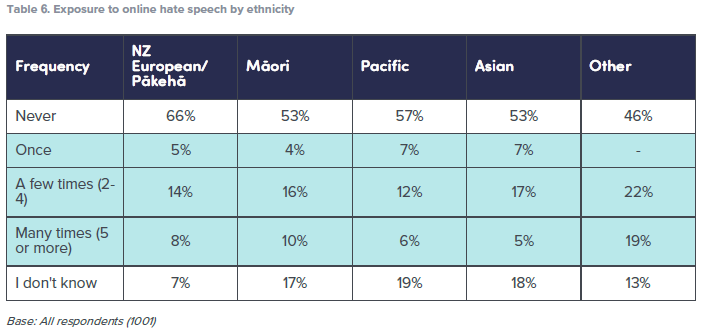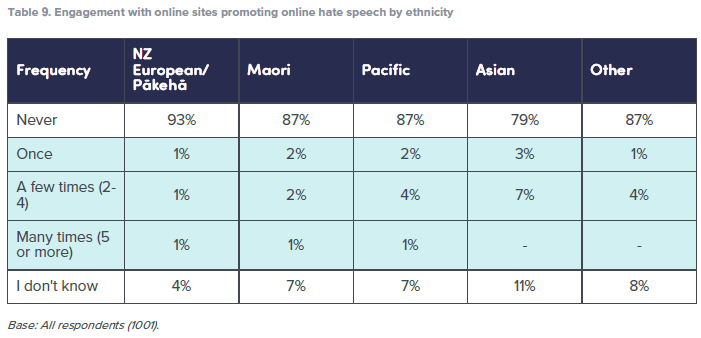This article extracts Māori specific information from the NetSafe report titled “Personal Experiences of Online Hate Speech and offers personal analysis of their results and my personal experience with online hate. I have critiqued the definitions used int he survey. That critique is at the end of the article.
Māori appear to be statistically better off than other minority ethnic groups being targeted by online hate. But if Māori were exposed to online hate, it was more persistent compared to others.
Pākehā are least likely to be exposed to online hate and least likely to believe online hate is about race/ethnicity.
My personal experience.
My personal experience of online hate is large and varied but I can summarise it into two categories of Māori and non Māori.
The online hate I receive from non Māori ranges a few hateful comments to paragraphs of diatribe. The worst occurs when there is a media article with comments turned on. I no longer read the comments as it is a hate fest of knee jerk statements.
From Māori it is the usual questioning who am I to say that, you do not speak on my behalf, derogatory comments about my southern Iwi links and how colonised and corporate we are, and knit picking my use of words. I do try to use terms such as “in my opinion” and only speak about topics I am knowledgeable in.
Often I am sent a Facebook message by younger Māori who want to express their concerns and by comments on my blog that use false email addresses (IP address is still visible).
The reo bullying sometimes plays a part with comments such as “why don’t you say it in reo?”. The most prolonged public hate dialogue I have endured was with a Māori television presenter though I do not see that person any more on television (I will not name the person or station). The hate speech and dialogue occurred on Facebook and was very public. The person had obviously seen my media appearances and read my blogs as the person was well informed about me. But then the person made claims that I was not an expert in the area, my interpretation was wrong and only a personal one, who am I?, what whakapapa rights do I have to say that, comments about being a fraud, a dreamer, egotistic and many other terms of hate.
Eventually, a mutual friend and a tuakana of both of ours told the offender that they were in fact wrong about the key facts that they used to abuse and belittle me. That if the offender knew their history and whakapapa they would see that I was correct. The abuse stopped after that. I then blocked the person on all social media.
A summary of key findings from the report:
- Māori were second least likely minority ethnic group (Pacific Islanders least) to experience online hate. Asians and those who identified themselves within the ‘other’ ethnicity were most likely to be victims.
- Māori, Pacific and Asian respondents perceived ethnicity as the reason for hate speech. Europeans/Pākehā believed religion.
- Māori believed that the motivations behind the online hate they were exposed to was mainly ethnicity but also political views.
- Māori are less likely to have ever experienced or been exposed to online hate compared to Pākehā, Pacific islanders and other ethnicities. But of all ethnicities that have experienced online hate, Māori are likely to experience online hate at a higher rate than all other ethnicities.
- 90% of Maori and 91% Asians believe online hate is racially motivated compared to 19% of Pākehā. Māori are more likely to see online hate being motivated by sexual orientation.
- Māori are least likely to see religion and disability as a reason for online hate.
- Māori are least likely to engage with online sites promoting online hate speech.
It would be great to see a sample survey of online Māori who write and produce Māori material online, engage in dialogue on social media and with media articles relating to Māori to see if there is any difference. Then a survey question asking how many people are on their social media block list due to hate speech.
Experienced online hate

- 75% of Māori never experienced online hate compared to Pākehā 86%, Pacific 77%, Asian 71%, Other 76%
- 4% of Māori experienced online hate once in the past year, same as Pākehā. Pacific 7%, Asian 8% and other 2%
- 7% of Māori experienced online hate 2-4 times in past year compared to Pākehā 4%, Pacific 5%, Asian 6%, Other 10%.
- 2% of Māori experienced online hate 5 or more times compared to Pākehā and Pacific 1%, Asian 2%, Other 2%.
- 12% of Māori replied that they did not know compared to Pākehā 5%, Pacific 10%, Asian 13%, Other 10%.
It would be interesting to know why some respondents said “I don’t know”. As this was an online survey, it is possible they had family or loved ones nearby and felt the need to say I don’t know?
Perceived reasons for online hate

- 90% of Maori and 91%Asians stated ethnicity as the perceived reason for online hate compared to 22% Pākehā, 79% Pacific.
- 19% of Māori stated gender as the perceived reason for online hate compared to Pakeha 9%, Pacific 13%, Asian 5%.
- 19% of Māori stated sexual orientation as the perceived reason for online hate compared to
- Pākehā 10%, Pacific 13%, Asian 16%.
- 26% of Māori stated religion as the perceived reason for online hate compared to 26% Pākehā and Pacific, 28 Asian and 15% other.
- 23% of Māori stated age as the perceived reason for online hate compared to 6% Pākehā, 15% Pacific.
- 15% of Māori stated Political views as the perceived reason for online hate compared to Pākehā 22%, Pacific 4%, Asian 23%.
- 23% of Māori stated appearance as the perceived reason for online hate compared to Pakeha 20%, Pacific 18%, Asian 21%.
- 10% of Māori stated other reasons for online hate compared to Pākehā 21%, Pacific 5%
I have included race and ethnicity together in the text above. Appearance could also fall into the same definition as Race/Ethnicity but it is not clear.
It is interesting that Pākehā do not see race and ethnicity as a reason for online hate.
Exposure to online hate

53% of Māori have never been exposed to online hate. Pākehā 66%, Pacific 57%, Asian 53%, Other 46%.
4% of Māori were exposed to online hate once in the previous year. Pākehā 5%, Pacific 7%, Asian 7%.
16% of Māori were exposed to online hate 2-4 times in the previous year. Pākehā 14%, Pacific 12%, Asian 17%, Other 22%.
10% of Māori were exposed to online hate 5 or more times in the previous year. Pākehā 8%, Pacific 6%, Asian 5%, Other 19%.
17% of Māori didn’t know if they were exposed to online hate in the previous year. Pākehā 7%, Pacific 19%, Asian 18%, Other 13%.
Engagement with online sites promoting online hate speech.

87% of Māori have never engaged with online sites promoting online hate speech compared to Pākehā 93%, Pacific 87%, Asian 79%, Other 87%.
1% of Māori have engaged with online sites promoting online hate speech compared to Pākehā 1%, Pacific 2%, Asian 3% and Other 1%.
2% of Māori have engaged 2-4 times with online sites promoting online hate speech compared to Pākehā 1%, Pacific 4%, Asian 7% and Other 4%.
1% of Māori have engaged 5 or more times with online sites promoting online hate speech compared to Pākehā 1%, Pacific 1% .
7% of Māori said they do not know if they have engaged with online sites promoting online hate speech compared to Pākehā 4%, Pacific 7%, Asian 11% and Other 8%.
Definitions from the NetSafe Report
Hate Speech
Netsafe use the definition of hate speech for the purpose of the report is “any technology-mediated speech or digital communication that offends, discriminates, denigrates, abuses and/or disparages a person(s) on the basis of a group-defining characteristic such as race, ethnicity, gender, nationality, sexual orientation, religion, age, disability, and others.
NZ European/ Pākehā
It is not clear why this is the only ethnic title that is bilingual in the report. For the purposes of the report, I will use only the word Pākehā as using the bilingual definition creates confusion.
Race
The reports uses Race, nationality and Ethnicity” as three different categories and offers no explanation to the difference. The Oxford online Dictionary defines them as:
Race
- Each of the major divisions of humankind, having distinct physical characteristics.
1.2 A group of people sharing the same culture, history, language, etc.; an ethnic group.
Ethnicity
The fact or state of belonging to a social group that has a common national or cultural tradition.
By using the two different definitions, it makes the online motivation for hate speech, racism less obvious and hides the real issues.
Nationality
- An ethnic group forming a part of one or more political nations.
Background to the report.
The 1001 18plus New Zealand respondents were made up as follows: Gender: Females 52%, Males 47.7%. 0.03% of participants identified as gender diverse. Ethnicity: Pākehā (71%), Māori (11%), Pacific (5%), Asian (11%), and other ethnicity (9%). Māori and Pacific sub-populations were deliberately ‘boosted’ beyond what would be achieved in a random sample to ensure representation.
The report does not state if the Māori percentages (or any percentages) are based on the 11% of Māori respondents or was an average of all the respondents.

Leave a Reply
You must be logged in to post a comment.